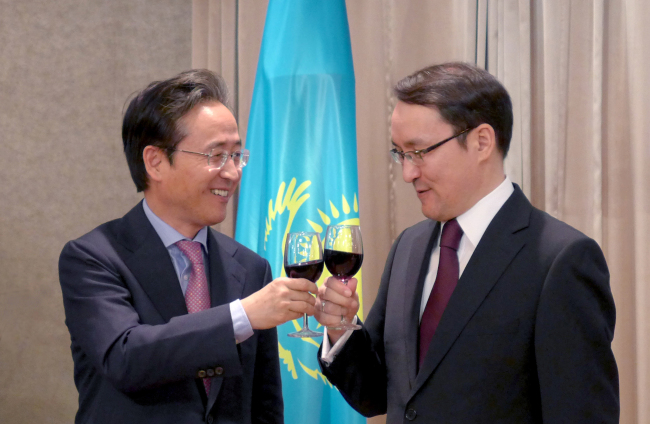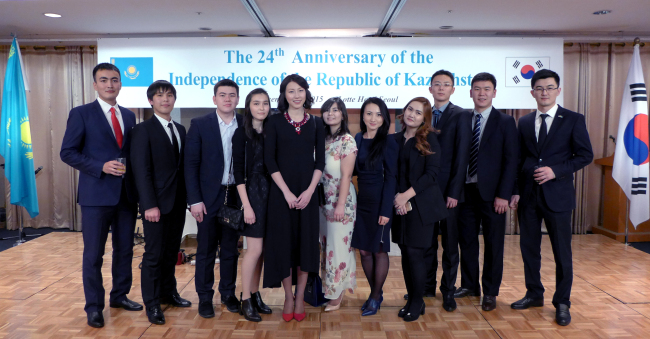The Kazakh Embassy on Tuesday marked the country’s founding on Dec. 16, 1991, and burgeoning ties with Korea at a reception in Seoul that featured photographs of the country’s remotest regions.
The pictures, part of the exhibition “Undiscovered Kazakhstan,” were selected by the Foundation of the First President of Kazakhstan, a public organization supporting young scientists, artists, students and researchers.
“Within a span of 24 years, Kazakhstan and Korea pushed our close relations to a comprehensive and strategic partnership that is still expanding,” Kazakh Ambassador Dulat Bakishev said in a speech.
“In the early 1990s, we scarcely knew each other, but we now have a solid number of bilateral agreements and joint economic projects.”
The pictures, part of the exhibition “Undiscovered Kazakhstan,” were selected by the Foundation of the First President of Kazakhstan, a public organization supporting young scientists, artists, students and researchers.
“Within a span of 24 years, Kazakhstan and Korea pushed our close relations to a comprehensive and strategic partnership that is still expanding,” Kazakh Ambassador Dulat Bakishev said in a speech.
“In the early 1990s, we scarcely knew each other, but we now have a solid number of bilateral agreements and joint economic projects.”

The Republic of Kazakhstan, a Central Asian powerhouse, gained independence from the former Soviet Union after seven decades as an “autonomous republic.”
Under the leadership of Kazakh President Nursultan Nazarbayev, who founded the country, Kazakhstan has undertaken far-reaching institutional and economic reforms, leading to political stability, financial freedom and social harmony, the ambassador said.
Astana has unveiled an ambitious “Kazakhstan 2050 Strategy” to enter the ranks of the world’s 30 most competitive economies over the next 35 years. The new economic policy “Nurly Zhol,” meaning the “Bright Path,” aims to overhaul transportation and energy infrastructure and modernize built-up spaces across the country, responding to the global economic slump. The plan also covers finance, manufacturing, housing and schooling.
In a state of the nation address in late November, Nazarbayev highlighted further reforms targeting the financial sector, fiscal policy, social policy, economic privatization and foreign investment.
“Our membership in the Eurasian Economic Union, involving Russia, Armenia, Belarus and Kyrgyzstan, boosts our attractiveness in terms of market opportunities,” the diplomat said. “In this context, we can help Korea’s Eurasia Initiative foreign policy under the banner ― ‘one continent,’ ‘creative continent’ and ‘peaceful continent’ ― through various bilateral and multilateral cooperation.”
Over 800 joint ventures are underway bilaterally, and summit meetings are held regularly between the two nation’s leaders.

Shin Bong-kil, president of the Institute of Foreign Affairs and National Security, noted in a speech that the country had become a middle power through the Kazakhstan 2050 Strategy and Nurly Zhol policy alongside acquiring membership in the World Trade Organization this year.
“Thanks to our complementary economies, Kazakhstan is Korea’s strategic partner and the biggest investment destination among the Commonwealth of Independent States,” Shin said. “We have similar languages, traditions and customs, and some 100,000 ethnic Koreans called Goryeoins have bridged our friendly and cooperative relationship.”
After the visa-waiver agreement in November last year, people-to-people exchanges have been rising, the Korean diplomat pointed out, adding that two direct flights between Astana and Seoul were added this summer. The Kazakh Consulate General will be launched in Busan next year.
Echoing Bakishev’s point, Shin stressed that the Nurly Zhol plan and Eurasia Initiative could be harmonized for a comprehensive energy and trade network across the Eurasian landmass.
Seoul and Astana cooperate closely through multilateral forums, including the South Korea-Central Asia Cooperation Forum and Korea-Central Asia Cooperation Secretariat, covering transportation, infrastructure, information communications technology, science, textiles, forestry and agriculture.
The 2017 International Exposition will be held in Astana under the theme of “Future Energy,” showcasing innovative solutions to global energy problems and sustainable development challenges.
By Joel Lee (joel@heraldcorp.com)




-
Articles by Korea Herald












![[Kim So-hyun] The quiet taxi driver from Paris](http://res.heraldm.com/phpwas/restmb_idxmake.php?idx=644&simg=/content/image/2024/04/25/20240425050891_0.jpg&u=)







